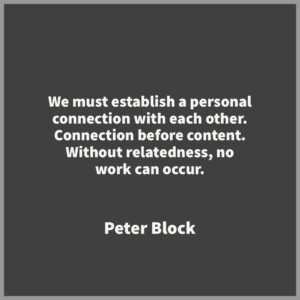 The pairing of those words piqued my curiosity.
The pairing of those words piqued my curiosity.
I suppose in some sense we are a library..a collection of life experiences….
Unique experiences that make us the individuals we are…
And also shared experiences that make us part of identity groups, communities, nations….humanity.
I pursued my curiosity about the Human Library and watched this short video.
At the heart, it’s really all about connecting people and surfacing their humanity.
So much of society, our schools included, are about dehumanizing behavior. It seems we see this at every turn these days.
How can we re-humanize?
Opportunities to tell our story (something we are comfortable with, of course) are both interesting and humanizing.
Here are some thoughts for moving something like the Human Library into our learning environments….
How do we better understand each other as human beings in a safe space?
- Select a word or a phrase that has been used to describe you…by others or by yourself. The word or phrase needs to be something that you are comfortable talking about and sharing a story or perspective about. You choose…the word or phrase can have a positive or negative connotation (i.e. writer, scuba diver, narcissist, control-freak, etc.). It may or may not be connected to your identity. It may be a “label” you ascribe to yourself or one you do not, but is ascribed to you by others.
- Within a given period of time, for telling and discussion, share a story about your word/phrase with a small group (2-3 others). It may be a story of positive or negative emotion, and should communicate how you feel being “labeled” with your word or phrase.
- Others in the group: respect the “book,” be curious, Ask interesting questions.
Some follow-up questions to ponder:
- Why is it important for us as learners to know the people we are learning with (i.e. build a community, of which the root word is “common”)?
- How did it make you feel to share your story and label?
- How did it make you feel to hear the stories of others?
- What might our classrooms (or workplaces, school boards, etc.) look like if we connected to our humanity first and more deeply?
—–
❓ Provocation:
In what ways can our learning communities leverage the core idea of connection behind the Human Library?
💎 Resource:
Connection before content – video
🧠 Mindset:
Inventor
💡 Mindshift:
Connection before Content
📣 Drop your thoughts in the comments, or in the Facebook group, and feel free to share resources. 🔥🔥🔥
- A silver lining - January 22, 2022
- Is our use of tech working against us? 🤔 - September 8, 2021
- What’s NOT going to change in the next 10 years? 🤔 - September 7, 2021